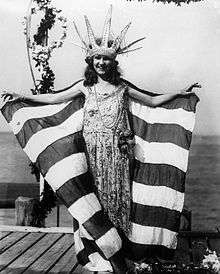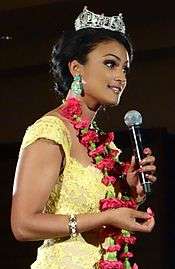Miss America
 | |
| Scholarship pageant | |
| Predecessor |
September 25, 1920 Atlantic City, New Jersey, U.S. (as The Fall Frolic) |
| Founded |
September 8, 1921 Atlantic City, New Jersey, U.S. |
| Headquarters | Atlantic City, New Jersey, U.S. |
Key people | Sam Haskell (Executive Chairman and CEO) |
| Website |
www |
Miss America refers to both "The Miss America Organization" (MAO) and "The Miss America Foundation" (MAF). The MAO "is a 501(c)4 non-profit organization that controls and oversees the local, state, and national competition framework and hosts the annual Miss America Competition and telecast" while the MAF is "a separate 501(c)3 non-profit organization that serves as the scholarship arm that processes scholarships for recipients across the country."[1] The competition is a scholarship pageant that is held annually and is open to women from the United States between the ages of 17 and 24. Originating in 1921 as a "bathing beauty revue", the contest is now judged on competitors' talent performances and interviews in addition to their physical appearance. Miss America travels about 20,000 miles a month, changing her location every 24 to 48 hours, touring the nation and promoting her particular platform of interest.[2]
The current titleholder, Miss America 2017, is Miss Arkansas 2016, Savvy Shields, who was crowned on September 11, 2016, by her predecessor Betty Cantrell (Miss America 2016).
Overview

The origins of the Miss America pageant lie in a 1920 event entitled The Fall Frolic. Held on September 25 in Atlantic City, New Jersey, the event was designed to bring business to the Boardwalk: "three hundred and fifty gaily decorated rolling wicker chairs were pushed along the parade route. Three hundred and fifty men pushed the chairs. However, the main attractions were the young 'maidens' who sat in the rolling chairs, headed by a Miss Ernestine Cremona, who was dressed in a flowing white robe and represented 'Peace.'"[3]
The event was so successful that The Businessmen's League planned to repeat it the following year as a beauty pageant or a "bather's revue"[3] (to capitalize on the popularity of newspaper-based beauty contests that used photo submissions).[3] Thus, "newspapers as far west as Pittsburgh and as far south as Washington, D.C., were asked to sponsor local beauty contests. The winners would participate in the Atlantic City contest. If the local newspaper would pay for the winner's wardrobe, the Atlantic City Businessmen's League would pay for the contestant's travel to compete in the Inter-City Beauty Contest."[3] Herb Test, a "newspaperman" coined the term for the winner as, "Miss America."[3] On September 8, 1921, 100,000 people gathered at the Boardwalk to watch the contestants from Washington, D.C., Pittsburgh, Harrisburg, Ocean City, Camden, Newark, New York, and Philadelphia.[3] The 16-year-old winner from Washington, D.C., Margaret Gorman, was crowned the "Golden Mermaid" and won $100.[3]
The pageant continued consistently over the next eight decades except for the years 1928–1932, when it was temporarily shut down due to financial problems associated with the Great Depression and suggestions that it promoted "loose morals."[4] With its revival in 1933, 15-year-old Marian Bergeron won, prompting future contestants to be between the ages of 18 to 26.[4] In 1935, Lenora Slaughter was hired to "re-invent" the pageant and served for 32 years as its Director.[4] By 1938, a talent section was added to the competition, and contestants were required to have a chaperone.[4] In 1940, the title officially became "The Miss America Pageant" and the pageant was held in Atlantic City's Convention Hall.[4] In 1944, compensation for "Miss America" switched from "furs and movie contracts" to college scholarships, an idea generally credited to Jean Bartel, Miss America 1943.[4][5]
During the early years of the pageant, under the directorship of Lenora Slaughter, it became segregated via rule number seven that stated: "contestants must be of good health and of the white race."[6] Rule number seven was abolished in 1950.[7] Miss New York 1945, Bess Myerson, the only Jewish American winner to date, became Miss America 1945 and faced antisemitism during her time as Miss America, leading to a cutback in her official duties.[8][9][10][11][12] Although there were Native American, Latina, and Asian-American contestants, there were no African-American contestants for fifty years (African-Americans appeared in musical numbers as far back as 1923, however, when they were cast as slaves).[6][13][14]
In 1970, however, Cheryl Browne, Miss Iowa 1970,[15][16][17] competed as the first African-American contestant in the Miss America 1971 pageant.[18][19][20] She also participated in one of the last USO-Miss America tours in Vietnam.[19] A decade later in 1983, Miss New York (and Miss Syracuse) 1983, Vanessa Williams (the first African-American woman to win the competition as Miss America 1984), faced discrimination in response to her win and later resigned under pressure due to a scandal involving nude photographs.[21][22] Three decades after these events, Miss New York (and Miss Syracuse) 2013, Nina Davuluri, the first Indian-American woman to win the crown as Miss America 2014, faced xenophobic and racist comments in social media when she won.[21][22] Two years later at the Miss America 2016 pageant, Miss America CEO Sam Haskell apologized to Vanessa Williams (who was serving as head judge) for what was said to her during the events of 1984.[23][24][25]
History

1921–1967
Margaret Gorman, Miss District of Columbia, was declared "The Most Beautiful Bathing Girl in America" in 1921 at the age of 16 and was recognized as the first "Miss America" when she returned to compete the next year. The contest that year was won by Mary Katherine Campbell (Miss Ohio) and again in 1923.[26] She returned to compete a third time in 1924 but placed as first runner-up that year, and pageant rules were then amended to prevent anyone from winning more than once. Beginning in 1940, Bob Russell served as the first official host of the pageant.[27] In 1941, Mifauny Shunatona, Miss Oklahoma, became the first Native American contestant.[28][29]
In 1945, Bess Myerson became the first Jewish-American and the first Miss New York[30] (competing as Miss New York City, a competition organized by a local radio station[10]) to win the Miss America pageant as Miss America 1945.[8][9][10][11] As the only Jewish contestant, Myerson was encouraged by the pageant directors to change her name to "Bess Meredith"[31] or "Beth Merrick",[8] but she refused.[8][31] After winning the title (and as a Jewish Miss America), Myerson received few endorsements[8][9][10][11][31] and later recalled that "I couldn't even stay in certain hotels […] there would be signs that read no coloreds, no Jews, no dogs. I felt so rejected. Here I was chosen to represent American womanhood and then America treated me like this."[31] She thus cut short her Miss America tour and instead traveled with the Anti-Defamation League. In this capacity, she spoke against discrimination in a talk entitled, "You Can't Be Beautiful and Hate."[8][9][10][11][31]
In 1948, Irma Nydia Vasquez, the first Miss Puerto Rico, became the first Latina contestant.[28][32][33] In addition, in 1948, Yun Tau Chee, the first Miss Hawaii, was also the first Asian-American contestant.[28] Miss America 1949, Jacque Mercer, was married and divorced during her reign; after this, a rule was enacted requiring Miss America contestants to sign a certification that they have never been married or pregnant.[34] Starting in 1950, although the pageant continued to be in September, the Miss America title changed to "post-dated", thus that year's pageant winner became Miss America 1951, and there was no Miss America 1950. The pageant was first televised nationally in 1954, hosted by Bob Russell.[27] Future television star Lee Meriwether was crowned Miss America 1955. It would also be the last time Russell served as host. He recommended, and was replaced by, Bert Parks, who served as the host for the second televised pageant in 1955 and stayed as host until 1979.[27][35] Television viewership peaked during the early 1960s, when it was the highest-rated program on American television.[36]
1968–2003
With the rise of second-wave feminism and the civil rights movement during the 1960s, the Miss America pageant became the subject of a series of protests that attacked it as sexist, racist, and part of U.S. militarism. The first demonstration took place during the Miss America 1969 pageant held on September 7, 1968 (won by Miss Illinois 1968, Judith Ford), when about 200 members of the group New York Radical Women demonstrated as part of the Miss America protest. In addition, a pamphlet distributed at the protest by Robin Morgan, No More Miss America!, became a source for feminist scholarship.[37] The protest was co-sponsored by Florynce Kennedy's Media Workshop, an activist group she founded in 1966 to protest the media's representation of African Americans, along with the feminist Jeanette Rankin Brigade and the ACLU.[38] Morgan later stated that the Miss America pageant "was chosen as a target for a number of reasons: it has always been a lily-white, racist contest; the winner tours Vietnam, entertaining the troops as a 'Murder Mascot'; the whole gimmick is one commercial shillgame to sell the sponsor's products. Where else could one find such a perfect combination of American values—racism, militarism, sexism—all packaged in one ‘ideal symbol,’a woman."[39] The protesters compared the pageant to a county fair where livestock are judged.[15][40] They thus crowned a sheep as Miss America and symbolically destroying a number of feminine products, including false eyelashes, high-heeled shoes, curlers, hairspray, makeup, girdles, corsets, and bras.[41] Burning the contents of a trash can was suggested, but a permit was unobtainable; news media seized on the similarity between draft resisters burning draft cards and women burning their bras. In fact, there was no bra burning, nor did anyone remove her bra.[42] The Women's Liberation Front later demonstrated at the Miss America 1971 pageant.[18]
Miss Iowa 1970,[17] Cheryl Browne, became the first African American contestant in the competition's history during the Miss America 1971 pageant (September 12, 1970).[15][16][18][19][20] Browne drew attention from reporters and from security personnel in Atlantic City who maintained a visible presence during pageant rehearsals.[19] Browne was not a finalist, however,[19] losing to future media personality, Miss Texas 1970, Phyllis George. In August 1971, Browne traveled to Vietnam with George, Miss Nevada 1970, Vicky Jo Todd, Miss New Jersey 1970, Hela Yungst, Miss Arizona 1970, Karen Shields, Miss Arkansas 1970, Donna Connelly, and Miss Texas 1970 (George's replacement), Belinda Myrick.[43] They participated in a 22-day United Service Organizations tour for American troops that began in Saigon.[19][43][44] Browne later commented that she thought "it was one of the last Miss America groups to go to Vietnam."[19] Miss Arkansas 1980, Lencola Sullivan, finished the Miss America 1981 pageant (September 6, 1980) as fourth runner-up, making her the first African American contestant to place in the top five.[28]
A few years later, Vanessa Williams (Miss New York 1983) won the title of Miss America 1984 on September 17, 1983, making her the first African American woman to wear the crown.[45] Williams later commented that she was one of five minority contestants that year, noting that ballet dancer Deneen Graham "had already had a cross burned on her front yard because she was the first black Miss North Carolina [1983]."[46] She also pointed out that "Suzette Charles was the first runner-up, and she was biracial. But when the press started, when I would go out on the - on the tour and do my appearances, and people would come up and say they never thought they'd see the day that it would happen; when people would want to shake my hand, and you'd see tears in their eyes, and they'd say, I never thought I'd see it in my lifetime - that's when, you know, it was definitely a very special honor."[46] Williams' reign as Miss America was not without its challenges and controversies, however. For the first time in pageant history, a reigning Miss America was the target of death threats and hate mail.[28][46] Williams was forced to resign seven weeks prior to the end of her time as Miss America, however, after the unauthorized publication of nude photos in Penthouse.[28][47][48][49] First runner-up, Miss New Jersey 1983, Suzette Charles replaced her for the final weeks of Williams' reign.[50]
In 1985, Miss Utah 1984, Sharlene Wells Hawkes, became the first foreign-born, bilingual Miss America, as she was born in Asunción, Paraguay.[51] Miss Alabama 1994, Heather Whitestone, won the 1995 pageant becoming the first deaf Miss America (she lost most of her hearing at the age of 18 months).[52][53] At the Miss America 1999 pageant held on September 19, 1998, Nicole Johnson (Miss Virginia 1998) became the first Miss America with diabetes and the first contestant to publicize an insulin pump.[54][55] Around the same time, Miss America officials announced they had lifted the ban on contestants who were divorced or had had an abortion. This rule change, however, was rescinded and Miss America CEO Robert L. Beck, who had suggested it, was fired.[56][57] Angela Perez Baraquio, Miss Hawaii 2000, was crowned Miss America 2001, thereby becoming the first Asian-American, the first Filipino-American, as well as the first teacher ever to win the pageant.[58]
2004–2014
A few years later, the Miss America 2005 pageant held on September 18, 2004, would be the last one televised live on ABC (which dropped the pageant after this broadcast, as it "drew a record-low 9.8 million viewers")[59] and the last one held in Atlantic City for ten years. Miss Alabama 2004, Deidre Downs, reigned as Miss America four months longer than usual as the Miss America 2006 pageant was moved to a January broadcast at the Las Vegas Strip's Theatre for the Performing Arts (Planet Hollywood Resort & Casino).[60][61] It was also broadcast live on MTV Networks' Country Music Television. After two years, the pageant moved to TLC (the former Learning Channel).[62][63] The Miss America 2011 pageant held on January 15, 2011, showcased Miss New York 2010, Claire Buffie, (the first Miss America contestant to advocate a gay-rights platform)[64][65] and Miss Delaware 2010, Kayla Martell, (the first bald contestant).[66][67] ABC also resumed broadcasting the pageant with the 2011 competition.[68] The Miss America 2013 pageant, held on January 12, 2013, was the last one to take place in Las Vegas.[69] Miss New York 2012, Mallory Hagan, won the competition but only served for nine months as the pageant moved back to its former broadcast slot in September 2014.[69][70] Miss Montana 2012, Alexis Wineman, ("America's Choice" winner) was the pageant's first autistic contestant.[71][72]
With the Miss America 2014 pageant, held on September 15, 2013, the competition returned to Boardwalk Hall, Atlantic City, New Jersey.[69] Miss New York (Nina Davuluri) won the title of Miss America. Davuluri was also the first Indian-American and second Asian-American to win the crown.[73][74] Shortly after her win, however, Davuluri became the target of xenophobic and racist comments in social media[75][76][77] relating the proximity of the event date to the 9/11 anniversary and to anti-Indian sentiment.[75][76][78][79][80] News agencies cited tweets that misidentified her as Muslim or Arab, associated her with groups such as Al-Qaeda, and questioned why she was chosen over Miss Kansas 2013, Theresa Vail,[75][76][78][81][82] (a soldier who won the "America's Choice" award and was the first contestant to display tattoos during the swimsuit competition).[83][84] Davuluri said that she was prepared for this backlash because "as Miss New York, I was called a terrorist and very similar remarks",[85][86] and Vail denounced the social media backlash, offering her support to Davuluri.[87][88] In addition, a torn ACL and MCL forced Miss Florida 2013, Myrrhanda Jones, to perform her baton routine with a decorated leg brace,[89] while Nicole Kelly (Miss Iowa 2013) was the first contestant without a forearm to compete in the pageant.[90]
Amanda Longacre, who was crowned Miss Delaware 2014 and was preparing to compete in Miss America 2015, was stripped of the title and the crown[91][92][93] because she was deemed to be too old.[91][92][93] Longacre filed a $3 million lawsuit,[91][92][93] and Miss America officials later blamed the error on state pageant officials whom, they said, "missed the age discrepancy in Longacre's submitted paperwork."[91][92][93] Miss New York 2014 (Kira Kazantsev) eventually won the title of Miss America 2015, making New York the first state to produce a winner for three consecutive years.[94][95] Shortly after Kazantsev was crowned in September 2014, however, comedian John Oliver ran a segment on his show, Last Week Tonight, that investigated the Miss America Organization's claim that it is "the world's largest provider of scholarships for women."[96] Oliver's team, which included four researchers with journalism backgrounds,[97] collected and analyzed the organization's state and federal tax forms to find that the organization's scholarship program only distributes a small fraction of its claimed "$45 million made available annually".[98] Oliver said that at the national level, the Miss America Organization and Miss America Foundation together spent only $482,000 in cash scholarships in 2012.[96] Oliver found that at the state level, the Miss Alabama pageant claimed that it had provided $2,592,000 in scholarships to Troy University despite not actually distributing any such scholarships.[99] The pageant appeared to multiply the value of a single available scholarship by the number of contestants theoretically eligible for it, while using the term "provided" in a way that did not mean "distributed."[100] The Miss America Organization responded by stating that Oliver affirmed that it provides the most scholarships to women and that the $45 million figure was based on all scholarships made available whether or not they are accepted.[101]
2015–present
In February 2015, Sharon Pearce announced that she was stepping down from her role as President of the Miss America Organization. At that time, the then-current CEO Sam Haskell was named Executive Chairman of the Miss America Organization, retained the title of CEO, and assumed all of Pearce's responsibilities.[102] In addition, Miss America 2014, Nina Davuluri, was appointed one of the new trustees to the Miss America Foundation.[103] In September 2015, Miss America officials announced that the organization grants $5.5 million in scholarships,[104] a number which still includes adding together offers of in-kind tuition waivers from multiple schools when a contestant could accept one at most.[105]
Thirty-two years after she resigned, Vanessa Williams returned to the Miss America stage on September 13, 2015, for the Miss America 2016 pageant as head judge (where Miss Georgia 2015, Betty Cantrell, won the crown).[106][107] The pageant began with Miss America CEO Sam Haskell issuing an apology to Williams, telling her that although "none of us currently in the organization were involved then, on behalf of today's organization, I want to apologize to you and to your mother, Miss Helen Williams. I want to apologize for anything that was said or done that made you feel any less the Miss America you are and the Miss America you always will be."[23][24][25] Suzette Charles (Williams' replacement) said in an interview with Inside Edition that she was perplexed over the apology and suggested that it was given for the purpose of ratings.[108] Williams also commented on the events surrounding her return, stating in an interview with Robin Roberts that "there's a lot of people who feel I should return, so the people who harbor the resentment I understand it but realize that all of those people that were part of the old guard are no longer there."[109] In the same interview, Roberts mentioned to Williams that in the present day (c. 2015), "people now release [similar] things to make a career." Williams responded: "That's crazy. To think that oh you can look at a scandal and think that that would be good for your career, where for me it took every ounce of credibility and talent that I had and wiped it out."[109]
On March 24, 2016, the Miss America Organization announced a contract renewal with ABC to continue carrying the pageant for the next three years to the 2019 edition.[110]
In June 2016, Erin O'Flaherty was crowned Miss Missouri, becoming the first openly gay Miss America contestant.[111]
Winners
Recent titleholders
| Year | Miss America | State Represented |
|---|---|---|
| Miss America 2017 | Savvy Shields | |
| Miss America 2016 | Betty Cantrell | |
| Miss America 2015 | Kira Kazantsev | |
| Miss America 2014 | Nina Davuluri | |
| Miss America 2013 | Mallory Hagan | |
Hosts
Present
- Chris Harrison: 2004, 2011–present[112][113][114][115]
- Sage Steele: 2016–present[115]
Past
- Brooke Burke: 2011–2013, 2016[112][116]
- Lara Spencer: 2014–2015[113][114]
- Mario Lopez: 2007, 2009–2010[117][118]
- Mark Steines: 2008[119]
- James Denton: 2006[119]
- Tom Bergeron: 2003[119]
- Wayne Brady: 2002[119]
- Tony Danza: 2001[119]
- Donny and Marie Osmond: 1999–2000[119](known collectively as "Donny & Marie")
- Boomer Esiason and Meredith Vieira: 1998[119]
- Eva LaRue and John Callahan: 1997[119]
- Regis Philbin: 1996[119]
- Regis Philbin and Kathie Lee Gifford: 1991–1995[119](known collectively as "Regis and Kathie Lee")
- Phyllis George: 1989–1990[119]
- Gary Collins: 1982–1990[119]
- Ron Ely: 1980–1981[119]
- Bert Parks: 1955–1980[35]
- Bob Russell: 1940–1954[27]
See also
- Miss America award winners
- Miss America's Outstanding Teen
- Miss America protest
- Vanessa Williams and Miss America
Further reading and viewing
Archives and collections
- Finding Aid to Beauty Pageant Collection at Browne Popular Culture Library, University Libraries, Bowling Green State University, Bowling Green, Ohio.
- What Beauty Pageant Queens Looked Like the Year You Were Born. Cosmopolitan, May 31, 2016.
- It Happened Here in New Jersey: Miss America - Photographs of various Miss America pageants.
- It Happened Here in New Jersey- Here She is: Miss America and the Protest of 1968
Books
- Banet-Weiser, Sarah. The Most Beautiful Girl in the World:Beauty Pageants and National Identity. Berkeley: University of California Press, 1999.
- Carlson, Gretchen (Miss America 1989). Getting Real. New York: Viking Press, 2015.
- Riverol, A.R. Live from Atlantic City: A History of the Miss America Pageant. Bowling Green, OH: Bowling Green State University Popular Press, 1992.
- Shindle, Kate (Miss America 1998). Being Miss America: Behind the Rhinestone Curtain. University of Texas Press, 2014.
- Wiliams, Vanessa (Miss America 1984) and Helen Williams. You Have No Idea: A Famous Daughter, Her No-nonsense Mother, and How They Survived Pageants, Hollywood, Love, Loss (and Each Other). New York: Gotham/Penguin Group, 2012.
Documentaries
- The American Experience: Miss America – American Experience, PBS (2001, 90 min)
References
- ↑ Miss America: FAQ
- ↑ Watson, Ellwood; Martin, Darcy (2000). "The Miss America Pageant: Pluralism, Femininity, and Cinderella All in One". Journal of Popular Culture. Wiley. 1 (34): 105–126.
- 1 2 3 4 5 6 7 "People & Events: The First Miss America Beauty Pageant, 1921". PBS.
- 1 2 3 4 5 6 "Miss America Timeline: 1901–1950". PBS.
- ↑ Shindle, Kate (2014). Being Miss America: Behind the Rhinestone Curtain. Discovering America. Austin: University of Texas Press. pp. 13–14. ISBN 978-0-292-73921-5.
- 1 2 "Miss America, People & Events: Breaking the Color Line at the Pageant". PBS.
- ↑ Daniel, G. Reginald (2006). Race and Multiraciality in Brazil and the United States: Converging Paths?. Pennsylvania State University. ISBN 978-0-271-04554-2. Retrieved September 22, 2013.
- 1 2 3 4 5 6 "PBS American Experience: Miss America Transcript". PBS American Experience. 2002.
- 1 2 3 4 Nemy, Enid (January 5, 2015). "Bess Myerson, New Yorker of Beauty, Wit, Service and Scandal, Dies at 90". New York Times.
- 1 2 3 4 5 Woo, Elaine (January 5, 2015). "Bess Myerson, Miss America who rose in politics and fell in scandal, dies at 90". Los Angeles Times.
- 1 2 3 4 Hollander, Sophia (January 5, 2015). "Bess Myerson, Beauty Queen Turned NYC Public Servant, Dies at 90". Wall Street Journal.
- ↑ Green, Michelle (June 29, 1987). "Downfall of An American Idol". People Magazine.
- ↑ Shirley Jennifer Lim (2007). A Feeling of Belonging: Asian-American Women's Popular Culture, 1930–1960. NYU Press. pp. 126–127. ISBN 0-8147-5193-8.
- ↑ Sarah Banet-Weiser (September 30, 1999). The Most Beautiful Girl in the World: Beauty Pageants and National Identity. University of California Press. pp. 153–166. ISBN 0-520-21791-8.
- 1 2 3 "It Happened Here in New Jersey: Miss America" (PDF). Kean University and the New Jersey Historical Commission. Retrieved March 5, 2015.
- 1 2 "Miss America, People & Events: Transcript". PBS.
- 1 2 "Former Miss Iowa Titleholders".
- 1 2 3 Musel, Robert (1970-08-26). "Television in Review". The Bryan Times p. 16 (United Press International).
- 1 2 3 4 5 6 7 Davis, Shirley (2000-10-19). "History follows former Miss Iowa First black pageant winner recalls her crowning moment". Quad-City Times.
- 1 2 "Black New Yorker chosen Miss Iowa". The Register-Guard. 1970-07-05.
- 1 2 Stern, Marlow (September 21, 2013). "Vanessa Williams, the First Black Miss America, On Nina Davuluri and Racism". The Daily Beast.
- 1 2 "Vanessa on Valentine's Day:The most successful Miss America in the entertainment world, Vanessa Williams brings her love of the stage to Caesars on Feb. 14.". Atlantic City Weekly. 2014-02-12.
- 1 2 Fitz-Gerald, Sean (2015-09-14). "Vanessa Williams Finally Got Her Miss America Apology". New York Magazine. Retrieved 2015-09-17.
- 1 2 Rogers, Katie (2015-09-14). "Vanessa Williams Returns to Miss America and Receives an Apology". New York Times. Retrieved 2015-09-14.
- 1 2 Robinson, Joanna (2015-09-14). "Watch Vanessa Williams Finally Receive an Apology at the Miss America 2016 Pageant". Vanity Fair. Retrieved 2015-09-13.
- ↑ Mary Katherine Campbell
- 1 2 3 4 "Bob Russell, Entertainer, Is Dead at 90". The New York Times. 2 February 1998.
- 1 2 3 4 5 6 "People & Events: Breaking the Color Line at the Pageant". PBS.
- ↑ Woo, Elaine (September 4, 1987). "Yun Tau Chee, 73; Miss Hawaii of 1948, First Asian in Miss America Pageant – Los Angeles Times". Articles.latimes.com. Retrieved September 22, 2013.
- ↑ "Bess Myerson Biography (Miss America 1945)". Miss America Organization.
- 1 2 3 4 5 Morrisroe, Patricia (March 30, 1987). "Bess and the Mess: Myerson's Slide Into Scandal (pp. 34–35)" (PDF). New York (magazine).
- ↑ "Cheryl Browne was the first African-American contestant as Miss Iowa in 1970.".
- ↑ "Miss America Pageant News". Pageantcenter.com. January 30, 2010. Retrieved September 22, 2013.
- ↑ "Pageant tightens grip on its ideals".
- 1 2 "American Experience - Miss America - People & Events".
- ↑ Bill Gorman (January 30, 2010). "Miss America Crowned; What Ever Happened to Beauty Pageants?". TV by the numbers. Retrieved December 15, 2011.
- ↑ Carole R. McCann and Seung-Kyung Kim (July 22, 2009). "Feminist theory reader: Local and Global Perspectives". New York: Routledge: 90–91. ISBN 0-415-99477-2.
- ↑ From Robyn Morgan to Atlantic City Mayor Richard Jackson, 28 August 1968: seeking a permit for a peaceful protest. In Morgan papers, Duke University; see http://library.duke.edu/digitalcollections/wlmpc/
- ↑ Robin Morgan, "The Oldest Front: On Freedom for Women," Liberation, an Independent Monthly, Vol. 13, No. 5, October 1968, pg. 34
- ↑ Greenfieldboyce, Nell (September 5, 2008). "Pageant Protest Sparked Bra-Burning Myth". NPR.
- ↑ Dow, Bonnie J. (Spring 2003). "Feminism, Miss America, and Media Mythology". Rhetoric & Public Affairs. 6 (1): 127–149. doi:10.1353/rap.2003.0028.
- ↑ Duffett, Judith (October 1968). WLM vs. Miss America. Voice of the Women's Liberation Movement.
- 1 2 Associated Press (1971-08-11). "People in News". Kentucky New Era p. 23.
- ↑ Cauley, Paul (1971). "Photographs by Paul Cauley, 1971 Door Gunner, A Co 101st Avn (Text by Belinda Myrick-Barnett)". Paul Cauley.
- ↑ Singleton, Don (1983-09-18). "Vanessa Williams is crowned the first African-American Miss America in 1983". New York Daily News. Retrieved 2015-09-14.
- 1 2 3 Martin, Michael (2010-05-10). "Vanessa Williams On Scandals, TV And Her Mom". NPR (National Public Radio). Retrieved 2015-09-14.
- ↑ Eady, Brenda (1984-08-06). "Vanessa's Story". People Magazine. Retrieved 2015-09-14.
- ↑ "Miss America firsts: Nina Davuluri, Vanessa Williams and more". The Washington Post. Retrieved September 22, 2013.
- ↑ "How Vanessa Williams Endured Her Miss America Scandal". OWN. Retrieved July 15, 2014.
- ↑ Chira, Susan. She has also lived in Brookville, Long Island
"TO FIRST BLACK MISS AMERICA, VICTORY IS A MEANS TO AN END", The New York Times, September 19, 1983. Accessed December 4, 2007. "Her home is in Mays Landing, 15 miles west of Atlantic City, the site of the contest." - ↑ "Miss America : 1985". Miss America. Retrieved 2014-02-07.
- ↑ "First Deaf Miss America – New York Times". Nytimes.com. September 19, 1994. Retrieved September 22, 2013.
- ↑ "Miss America firsts: Nina Davuluri, Vanessa Williams and more". The Washington Post. Retrieved September 22, 2013.
- ↑ "A Crown, Scepter & Insulin Pump The New Miss America, Nicole Johnson, Has Drawn Attention To The Device, Which Frees Diabetics From The Strict Scheduling Of Conventional Insulin Regimens. - Philly.com". Articles.philly.com. October 5, 1998. Retrieved September 22, 2013.
- ↑ Kaplan-Mayer, Gabrielle (2003). Insulin Pump Therapy Demystified: An Essential Guide for Everyone Pumping. Marlowe & Co. ISBN 0-7867-3068-4. Retrieved September 22, 2013.
- ↑ Brodeur, Nicole (September 19, 1999). "Here She Is, Miss America: Pageant Faces Reality And Recoils". The Seattle Times.
- ↑ "Miss America Finds A Ceo Down By The Boardwalk After 1999's Furor Over Rules Changes, The Former Claridge Official Says He Will Rebuild Bridges To State Pageants.".
- ↑ Miss America 2001
- ↑ de Moraes, Lisa (October 21, 2004). "No More Miss America Pageantry for ABC". Washington Post.
- ↑ Kimberly Nordyke (March 30, 2007). "CMT Drops Miss America Pageant". Reuters. Retrieved December 15, 2011.
- ↑ Peterson, Iver (April 9, 2005). "'Fear Factor' Era Poses a Challenge For Miss America". The New York Times. NYTimes.com. Retrieved December 15, 2011. (registration required (help)).
- ↑ Richard Huff (August 13, 2007). "TLC's the latest to pick Miss America". New York Daily News. nydailynews.com. Retrieved December 15, 2011.
- ↑ Shindle, p.182.
- ↑ "Miss Kansas Bares Tattoos and 6 Other Memorable Miss America Moments | TIME.com". Newsfeed.time.com. September 14, 2013. Retrieved September 22, 2013.
- ↑ Leach, Robin (January 14, 2011). "2011 Miss America photos: Four contestants stand out among field – Las Vegas Sun News". Lasvegassun.com. Retrieved September 22, 2013.
- ↑ "Miss Delaware, Bald and Bold". CBS News. June 28, 2010. Retrieved June 30, 2010.
- ↑ "Miss America firsts: Nina Davuluri, Vanessa Williams and more". The Washington Post. Retrieved September 22, 2013.
- ↑ Robin Leach (January 17, 2011). "2011 Miss America Pageant: Ratings increase 47% for ABC telecast". Las Vegas Sun. lasvegassun.com. Retrieved December 15, 2011.
- 1 2 3 Source, The Reliable (12 June 2013). "Miss America Mallory Hagan in D.C.: Making most of short tenure" – via washingtonpost.com.
- ↑ "Miss America to air from Atlantic City on Sept. 15". www.usnews.com. 2013-03-20. Retrieved 2013-03-20.
- ↑ "Miss America firsts: Nina Davuluri, Vanessa Williams and more". The Washington Post. Retrieved September 22, 2013.
- ↑ "Alexis Wineman, Miss Montana, First Miss America Contestant Diagnosed With Autism". ABC News. Retrieved January 12, 2013.
- ↑ Cavaliere, Victoria (September 16, 2013). "Miss New York is first Indian-American to win Miss America". Reuters. Retrieved September 23, 2013.
- ↑ Mascarenhas, Roland (October 4, 2013). "Opinion: Why Nina Davuluri matters". The Vancouver Sun.
- 1 2 3 Hafiz, Yasmine (September 16, 2013). "Nina Davuluri's Miss America 2014 Win Prompts Twitter Backlash Against Indians, Muslims". Huffington Post.
- 1 2 3 Abad-Santos, Alex (September 16, 2013). "The First Indian-American Miss America Has Racists Very, Very Confused". The Atlantic.
- ↑ Wischhover, Cheryl (September 26, 2013). "Is Bollywood the New Zumba?". ELLE.
- 1 2 Broderick, Ryan (September 16, 2013). "A Lot Of People Are Very Upset That An Indian-American Woman Won The Miss America Pageant". BuzzFeed.
- ↑ Judkis, Maura (September 22, 2013). "Miss America fights post-pageant racism with a beauty queen's poise". Wall Street Journal.
- ↑ Greenhouse, Emily (September 20, 2013). "COMBATTING TWITTER HATE WITH TWITTER HATE". The New Yorker.
- ↑ Editorial (September 19, 2013). "Pigment of our imagination". Chennai, India: The Hindu.
- ↑ Stuart, Tessa (September 16, 2013). "Fox Host Todd Starnes Outraged That Indian-American Nina Davuluri Won Miss America". The Village Voice.
- ↑ Vail, Theresa (August 22, 2013). "God, Grant Me the Courage to Change the Things I Can". Miss Kansas Blog.
- ↑ Linton, Caroline (September 14, 2013). "Miss Kansas Bares Her Tattoos". The Daily Beast.
- ↑ Khemlani, Anjalee (November 16, 2013). "Miss America promotes cultural dialogue amid racist stereotypes". The Press of Atlantic City.
- ↑ Keeler in the Morning (October 2, 2013). "[AUDIO] Miss America on Keeler in the Morning". WIBX950 AM. Retrieved October 2, 2013.
- ↑ Vail, Theresa (September 2013). "Theresa's September Blog". Miss Kansas.
- ↑ Brady, Dani (September 29, 2013). "The story behind the crown: an interview with Miss Kansas 2013". University Daily Kansan.
- ↑ "Miss Florida, Despite Knee Injury, Wins Miss America Talent Competition". ABC News. September 13, 2013. Retrieved 2014-06-12.
- ↑ Parry, Wayne. "Miss America contestant born without forearm: 'I'm just like you'".
- 1 2 3 4 "Dethroned Miss Delaware Amanda Longacre Files $3 Million Lawsuit". ABC News. 2014-07-17.
- 1 2 3 4 Brown, Robin (2014-07-17). "Ousted beauty queen sues Miss Del. pageant". The News Journal.
- 1 2 3 4 Burns, Francis (2014-07-17). "Miss Delaware ousted for being too old sues pageant". United Press International.
- ↑ Ashleigh Schmitz. "Miss America 2015: 5 Things to Know About Kira Kazantsev". Parade.condenast.com. Retrieved 2015-05-08.
- ↑ Friedman, Molly (September 15, 2014). "The secrets behind New York's stunning three Miss America wins in a row". New York Daily News.
- 1 2 Rupar, Aaron (24 September 2014). "John Oliver's Devastating Takedown of Miss America Has a Local Angle". City Pages. Retrieved 28 August 2015.
- ↑ Blake, Meredith (4 February 2015). "Seven things we learned at breakfast with John Oliver". Los Angeles Times. Retrieved 28 August 2015.
- ↑ Chung, Jen (22 September 2014). "Video: John Oliver Shreds Miss America's Claim To Be "Leading Provider" Of Scholarships To Women". Gothamist. Retrieved 28 August 2015.
- ↑ Herman, Barbara (22 September 2014). "John Oliver Takes On Miss America Pageant's 'Unbelievable' Scholarship Claims". International Business Times. Retrieved 28 August 2015.
- ↑ "Last Week Tonight with John Oliver: Miss America Pageant (HBO)". YouTube. 21 September 2014. Retrieved 28 August 2015.
- ↑ Remnick, Alex (September 22, 2014). "Miss America Organization responds to John Oliver's segment on pageant". NJ.com.
- ↑ "The Miss America Organization Announces New Leadership Team: Sam Haskell Elevated to Executive Chairman". Miss America Organization. February 27, 2015.
- ↑ "Two Elected to Miss America Foundation Board of Trustees". Miss America Organization. February 27, 2015.
- ↑ Kelley, Daniel (September 13, 2015). "Vanessa Williams and the Miss America song return to the pageant". Reuters.
- ↑ "Miss America Organization Scholarship Overview" (PDF). Retrieved September 11, 2016.
- ↑ "Miss America 2016 - Vanessa Williams - Oh How the Years Go By (9-13-15)". Miss America 2016. 2015-09-13. Retrieved 2015-09-22.
- ↑ ABC News. "Vanessa Williams on Returning to Miss America After Scandal". ABC News. Retrieved September 11, 2015.
- ↑ Inside Edition (2015-09-14). "Beauty Queen Who Won Vanessa Williams' Crown: Miss America Apology Was About Ratings". Inside Edition. Retrieved 2015-09-18.
- 1 2 Roberts, Robin (2015-09-11). "Vanessa Williams on Returning to Miss America After Scandal". ABC News. Retrieved 2015-09-11.
- ↑ "THE 96TH MISS AMERICA COMPETITION TO AIR ON SUNDAY, SEPTEMBER 11TH AT 9:00 PM ET/PT ON ABC; "The 2017 Miss America Competition" To Broadcast Live From Historic Boardwalk Hall In Atlantic City" (Press release). Miss America Organization. 24 March 2016. Retrieved 28 March 2016.
- ↑ CNN. "First openly gay Miss America contestant". CNN. Retrieved 5 July 2016.
- 1 2 Bobbin, Jay (2011-01-06). "There she is again: Brooke Burke, Chris Harrison welcome Miss America back to ABC". Zap2it. Retrieved 2013-10-07.
- 1 2 "Chris Harrison, Lara Spencer to Host Miss America 2014". ABC News. May 20, 2013. Retrieved May 9, 2014.
- 1 2 Kuperinsky, Amy (August 14, 2014). "Miss America 2015: Judges include N.J.'s Gary Vaynerchuk". The Star-Ledger.
- 1 2 Chris Harrison Will Return to Host the Miss America Competition with First-Time Host Sage Steele of ESPN
- ↑ Friedlander, Whitney (28 August 2015). "Brooke Burke-Charvet Returns as Miss America Co-Host".
- ↑ "Lopez to host Miss America pageant again". 1 December 2008.
- ↑ "WHAT TO WATCH".
- 1 2 3 4 5 6 7 8 9 10 11 12 13 Miss America: FAQ
External links
| Wikimedia Commons has media related to Miss America. |




